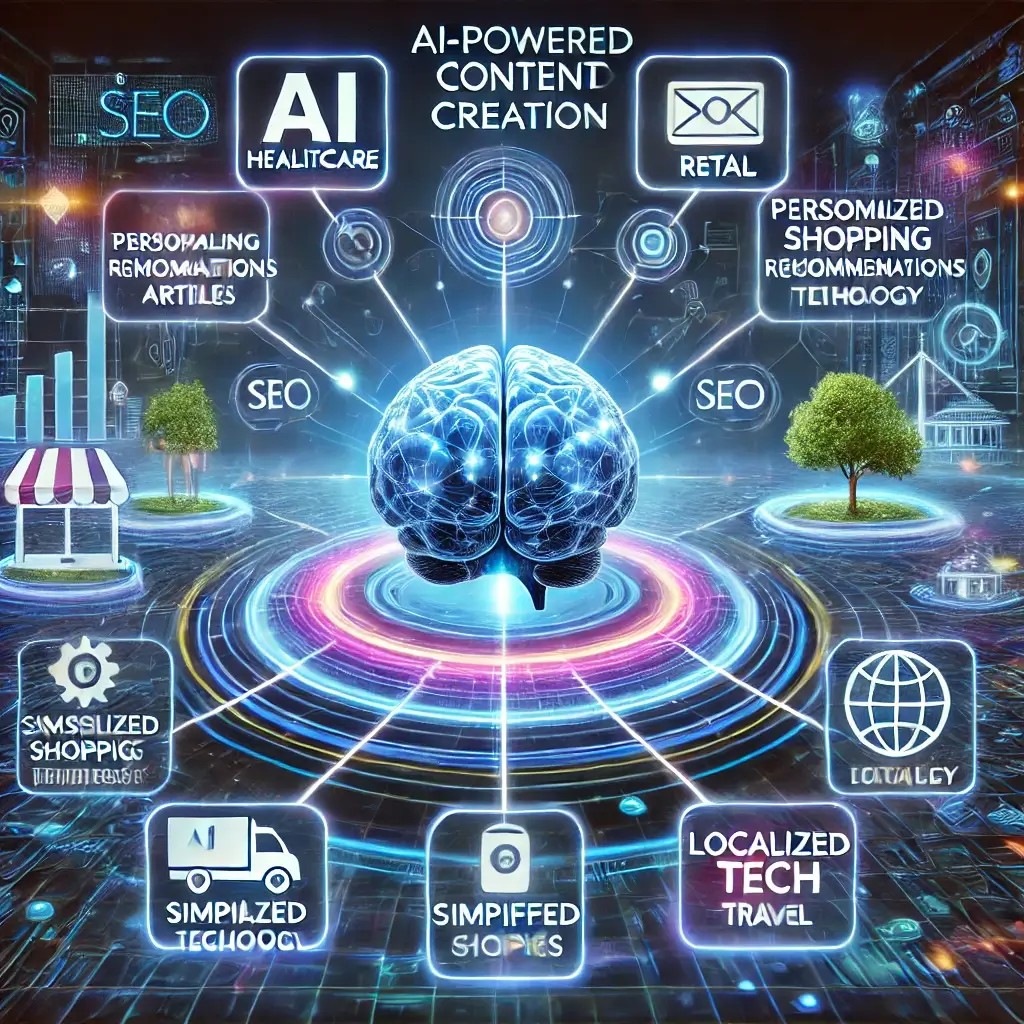The Digital Landscape Demands Innovation
In today’s competitive digital landscape, industries are under constant pressure to innovate and stay ahead. One of the most transformative tools available to businesses is artificial intelligence (AI), particularly in the realm of search engine optimization (SEO). AI-driven content has unlocked new possibilities for improving online visibility, engaging target audiences, and driving conversions across various industries.
Strategic AI Implementation Is No Longer Optional
As we move closer to 2025, the strategic implementation of AI into industry-specific SEO strategies is no longer optional—it’s essential. From eCommerce and healthcare to technology and hospitality, AI-generated content is reshaping the way businesses communicate with their audiences. This article provides a focused analysis of how different industries can leverage AI for SEO, complete with actionable insights and real-world case studies.
AI-Driven SEO in Key Industries
AI-Driven SEO in Key Industries
Healthcare: Building Trust Through Expert Content
Healthcare professionals must convey accurate, trustworthy information to build credibility and foster patient trust. AI tools such as Jasper and Writesonic can assist in generating educational content while maintaining compliance with medical standards.
Real Results in Telehealth Content Marketing
Case Example: A telehealth provider utilized AI to create patient-centric blogs addressing frequently searched health concerns. These articles, paired with human-reviewed edits, increased organic traffic by 45% within three months (Jasper, 2024).
Making Complex Medical Information Accessible
AI also simplifies complex medical terminology, making information more accessible to a wider audience. By integrating SEO-optimized FAQs and guides, healthcare providers can improve their rankings and build stronger connections with patients.
Retail: Creating Personalized Shopping Experiences
In the retail sector, personalization is key to engaging consumers and boosting sales. AI enables retailers to create tailored product descriptions and dynamic content that aligns with user preferences and shopping behavior.
Converting Visitors Through Personalized Landing Pages
Case Study: An online fashion retailer used Writesonic to produce personalized landing pages for each customer segment, leading to a 30% increase in conversion rates (Forbes, 2023).
Staying Ahead of Consumer Search Trends
By analyzing search patterns, AI tools like Semrush help retailers identify trending keywords, enabling them to launch targeted campaigns faster than competitors. This proactive approach ensures relevancy and captures consumer interest at the right time.
Technology: Translating Technical Concepts for Everyone
Technology companies often face the challenge of communicating complex ideas to non-expert audiences. AI tools excel in breaking down technical jargon into digestible content while maintaining accuracy.
Building Authority Through Educational Content
Example: A blockchain company utilized AI to draft beginner-friendly guides about decentralized finance. These resources attracted a 60% increase in web traffic and established the brand as an authority in the field (BrightEdge, 2023).
Optimizing for High-Value Technical Keywords
AI-powered tools like Clearscope also ensure that tech companies’ content aligns with high-value keywords, improving their search engine rankings and visibility in competitive markets.
Hospitality: Connecting with Local Travelers and Tourists
For the hospitality industry, local SEO is a critical factor in attracting customers. AI-generated content can create hyper-localized landing pages and blog posts that resonate with specific regions and demographics.
Boosting Off-Season Bookings with Regional Content
Case Study: A boutique hotel chain used AI to produce city-specific travel guides, improving their local search rankings by 50% and boosting bookings during off-peak seasons (Semrush, 2024).
Capturing Local Flavor in Content Marketing
By combining AI insights with cultural nuances, businesses in the hospitality sector can create compelling, location-based content that draws in tourists and locals alike.
Balancing AI Efficiency with Ethical Standards
While the benefits of AI in SEO are undeniable, ethical considerations must not be overlooked. Transparency in disclosing AI’s role in content creation fosters trust and credibility. Moreover, businesses should combine AI-generated drafts with human oversight to maintain quality and originality.
The Hybrid Approach to Content Creation
Example: A technology consultancy firm employed a hybrid model—AI for initial content generation and human editors for refinement—achieving a 40% improvement in client engagement while adhering to ethical guidelines (Google, 2023).
Staying Compliant with Search Engine Standards
Practical considerations include keeping up with search engine algorithm updates to avoid penalties. AI tools must evolve alongside these changes, ensuring compliance and long-term success.
The Future of AI-Enhanced Content Marketing
Emerging Trends and Future Implications
Visual Content Gets the AI Treatment
AI-Enhanced Visual Content: Beyond text, AI tools are beginning to generate SEO-optimized visuals, which will play a significant role in industries like fashion, real estate, and eCommerce.
Content That Adapts to User Behavior in Real-Time
Real-Time Personalization: AI will further advance the ability to deliver content that adapts to users’ real-time behaviors, enhancing engagement and conversion rates.
Reducing the Environmental Impact of Digital Marketing
Sustainability in Digital Strategies: Industries will lean on AI to reduce resource-intensive content production processes, aligning with global sustainability goals.
Breaking Language Barriers in Global Marketing
Voice and Multilingual SEO: With the rise of voice search and global markets, AI tools capable of generating multilingual, conversational content will become indispensable.
The Strategic Integration of AI in Content Marketing
AI-driven content is revolutionizing SEO across industries, enabling businesses to produce targeted, scalable, and high-quality content. From healthcare to retail, technology, and hospitality, the applications of AI are as diverse as the industries it serves. Success lies in strategically integrating AI tools into workflows while maintaining ethical standards and human oversight. By doing so, businesses can stay ahead in the ever-evolving digital landscape, ensuring both competitiveness and customer satisfaction.
Industry Research and Further Reading
References
Jasper. “AI in Healthcare Content Creation.” Published 2024. Link
Forbes. “AI and Personalization in Retail.” Published 2023. Link
BrightEdge. “Simplifying Technical Content with AI.” Published 2023. Link
Semrush. “Local SEO Strategies Powered by AI.” Published 2024. Link
Google. “Best Practices for Ethical AI Implementation.” Published 2023. Link
